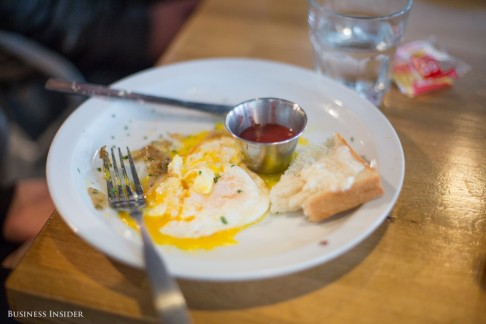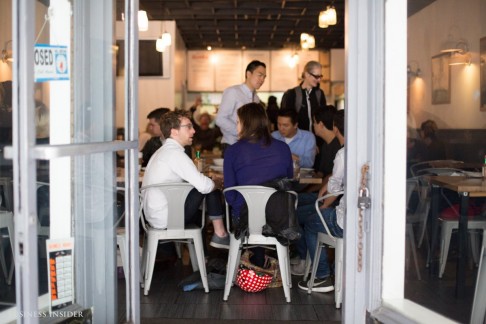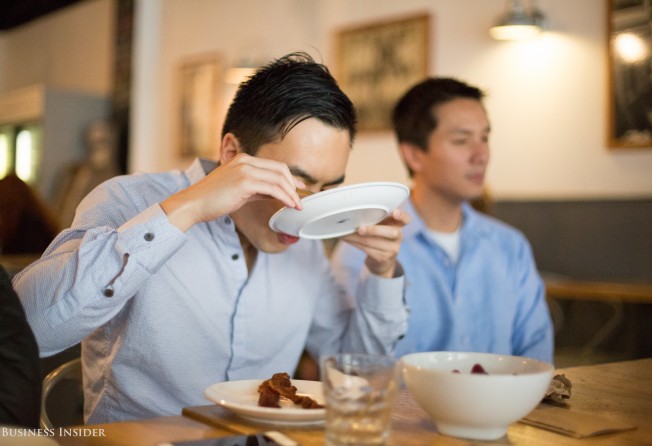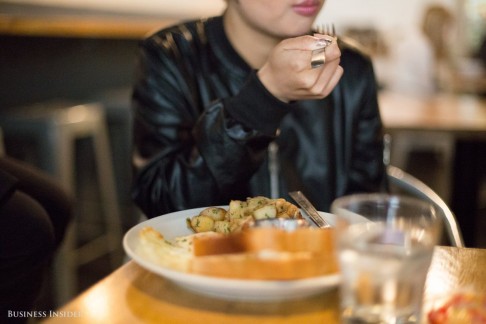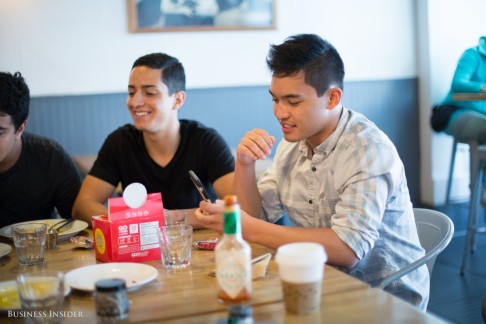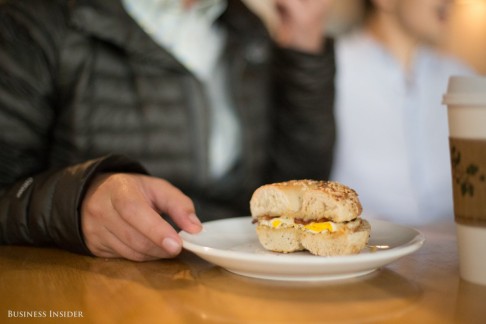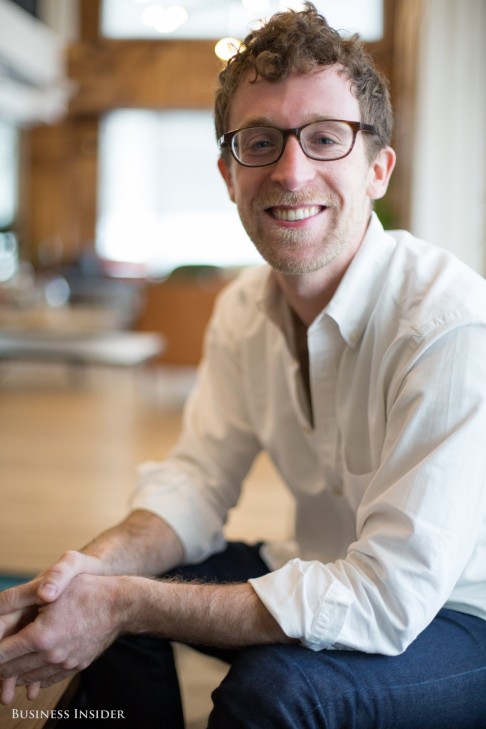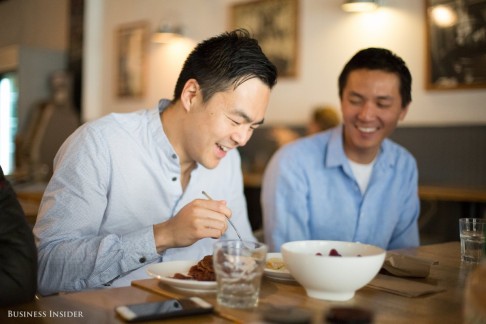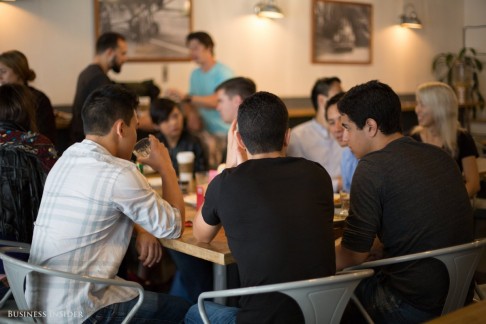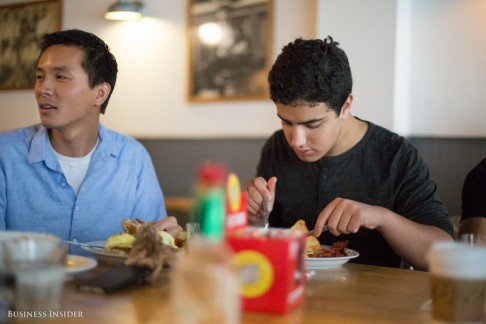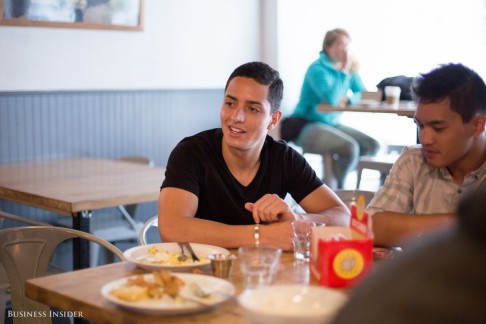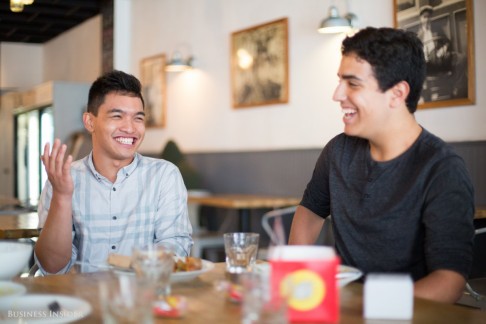Breakfast on Wednesday morning is engineer Paul Benigeri's favorite meal of the week. Why? "I haven't eaten in 60 hours," Benigeri says in a sunlit café in San Francisco, after clearing through a frittata with no spinach and extra goat cheese.
Benigeri and his coworkers at Nootrobox, a subscription service for "smart drugs," or cognition-enhancing supplements, are part of a Bay Area group of biohacking enthusiasts called WeFast. The club believes that intermittent fasting promotes longevity, increases focus and productivity, and leads to a healthier diet.
The first rule of WeFast is, you eat as soon as your food hits the table.
Photo: Melia Robinson/Business Insider
The group meets every Wednesday morning at an Italian counter-service restaurant. By the time they sit down to break the fast, most members of the group, which formed in 2015, haven't eaten in about 36 hours.
Photo: Melia Robinson/Business Insider
Intermittent fasting is a nascent Silicon Valley fad in which people go without food for anywhere from 14 hours to several days. It's increasingly popular among start-up workers.
Photo: Melia Robinson/Business Insider
While it may sound like torture, these young entrepreneurs may actually be onto something with intermittent fasting
Photo: Melia Robinson/Business Insider
Studies in mice suggest that temporarily abstaining from food may increase life span.
Photo: Melia Robinson/Business Insider
When the body goes into fasting mode, it stops producing as many growth-related hormones and proteins, which are also linked to cancer and diabetes. Instead, the body takes a little break to repair cells — a crucial process for improving longevity.
This "maintenance state" may be the key to unlocking longer lives.
Research in animals from the Longevity Institute at the University of Southern California supports this idea. Mice that fasted for two to five days a month showed reduced biomarkers for diabetes, cancer, and heart disease, as well a rejuvenated immune system.
The group recently expanded its subject pool from mice to humans.
For Michael Brandt, cofounder and COO of Nootrobox, it's not just about living longer, but living better. He describes intermittent fasting as hitting the reset button on his wellness.
Photo: Melia Robinson/Business Insider
When he fasts, he doesn't have to worry about indigestion or food comas. There's never anxiety over where his next meal will come from. He can focus on work fully.
Michael Brandt's plate. Photo: Melia Robinson/Business Insider
His cofounder, Geoffrey Woo, says Tuesdays (when the whole company fasts) are their most productive days. He lifts a plate to his mouth to slurp up the remaining egg yolks.
Photo: Melia Robinson/Business Insider
Last December, the pair launched WeFast by creating a new group on the messaging service Slack. They wanted to make it easier for novice fasters to find the resources and support they need to feel successful. They also began holding weekly breakfasts, or "breaks from fast."
Photo: Melia Robinson/Business Insider
WeFast members use Slack to organize events, share new research, get advice, and post the occasional food-porn photo, which some describe as "dark humor."
Photo: Melia Robinson/Business Insider
Zhill, a social-media manager at Nootrobox, was shocked when he found out his new coworkers voluntarily starve themselves. But after trying his first fast last week, he felt like he gained lots of time and was better at maintaining focus throughout the day.
Photo: Melia Robinson/Business Insider
Paul Benigeri began intermittent fasting long before he joined Nootrobox. His friends and family never really got it, always giving him the conventional wisdom about "breakfast being the most important meal of the day."
Photo: Melia Robinson/Business Insider
At Nootrobox, he found people who shared his interest in longevity and healthy living. But when a friend rolls in town, it's "not the end of the world" if he breaks fast early, he says.
Photo: Melia Robinson/Business Insider
Brandt stresses that the company doesn't pressure any employees to fast. "No one's getting fired for eating on a Tuesday," he jokes. "We're not slapping sandwiches out of people's hands."
Photo: Melia Robinson/Business Insider
Instead, they hope to empower people with food, or the lack thereof.
Photo: Melia Robinson/Business Insider
